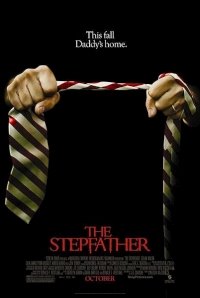
THE STEPFATHER
US, 2009, 101 minutes, Colour.
Dylan Walsh, Sela Ward, Penn Badgley, Amber Heard, Jon Tenney.
Directed by Nelson Mc Cormick.
The Stepfather has strong credentials. It is a remake of a film for which Donald E. Westlake wrote the screenplay (Westlake was a celebrated novelist, The Hot Rock, The Split). This adaptation is by J.S. Cardone, writer and director of a number of B-budget horror films.
The film was originally made by Joseph Rubin in 1987 with Terry O’ Quinn as the terrifying stepfather. This time his place was taken by Dylan Walsh. Sela Ward plays the mother of the family which is to be terrorised. Penn Badgley is the rebellious son.
The film is a suburban terror film. Walsh plays a serial killer, a charming man, who ingratiates himself with widows or divorced mothers and takes over the household. He seems perfectly normal, perfectly charming. However, eventually his mask is shattered, he makes mistakes, and then murders the families. The film opens with such an episode but spends most of the time focusing on one particular family – who defy him. However, the film has the possibilities for a sequel as the stepfather goes free and disappears again.
The film raises all kinds of issues of family life in the modern world, divorce, absent fathers, the need for a father figure in the family, compliant children, rebellious children, the nature of discipline in the house.
1. This film as suburban terror, audiences identifying with the characters, the situations? The possibilities for this kind of killer to be loose in the community?
2. American suburbia, homes, the streets, real estate agents, schools, swimming pools? Ordinary atmosphere? The musical score?
3. The overtone of the title? Genial stepfathers? Sinister stepfathers? The need for father figures?
4. The opening, David Harris, getting up in the morning, shaving, getting ready to go out – and then the audience seeing the murdered family? Immediate response to David Harris?
5. Six months later, Susan and the children in the supermarket? David talking with them, talking discipline? The immediate attraction? At the checkout? Parking? Susan and her approach? David and his response?
6. The passing of time, Susan in relationship with David? The past with her divorce? Michael and his resentment towards his father? The young boy and his response? The daughter? The ordinary life in the household? Domestic happiness? Yet the audience on edge?
7. Michael coming home, his relationship with Kelly? David and his bonding with him? The issue of the military school and his not going back? The summer, swimming training? David organising things?
8. Jay turning up, his encounter with David? His antagonism towards Susan? The reason for the break-up? His taking the younger children for the weekend? Michael and his not wanting to go? The young boy and talking about the discipline? Jay returning, confronting David? His later coming to apologise? David receiving him, luring him in, killing him? The body in the cellar? His pretending that Jay had not come? Texting to Michael?
9. The issues of discipline in the house? David always having an answer?
10. His job, Susan’s sister and her partner? Real estate? His smooth talking to the customers and getting the deal, his not filling in the papers, resigning from the job, intending to travel? Going on the internet? Finding out about himself? Making the contacts?
11. The manifestations of unrest? Michael and his suspicions? His relationship with Kelly? David and his watching, comments? Their searching his room? His threats about the military school?
12. His work in the cellar, everything locked? The plans?
13. Michael, the reaction against David? The beginning of the terror?
14. The family, David and his terrorising them? Their fear? Michael, the fall, in a coma?
15. The family safe – and David disappearing, to begin all over again?